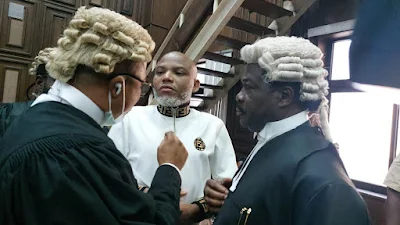The Federal Government will on Monday, November 14 resume the trial of the leader of the proscribed Indigenous People of Biafra (IPOB) Nnamdi Kanu on terrorism charges brought against him.
The trial will centre only on seven out of 15 count charges sustained against Kanu by Justice Binta Nyako of the Federal High Court in Abuja.
A member of Nnamdi Kanu’s lawyers, Mr Ifeanyi Ejiofor, confirmed that the trial would commence on November 14 having received notice from the court to the effect.
However, DAILY POST gathered that the trial would be vehemently opposed by the leader of the legal team, Chief Mike Ozekhome, a Senior Advocate of Nigeria, SAN.
Our correspondent was reliably informed that a motion on notice objecting to the commencement of the trial has already been filed and would take the front stage at the November 14 proceedings.
DAILY POST observed that the objection to the trial was predicated on two grounds which were the judgment of the Court of Appeal delivered in October which voided the rendition of Kanu from Kenya to Nigeria and subsequently quashed the terrorism charges and discharged him from the alleged offences.
The second ground was the appeal against the Court of Appeal decision brought to the Supreme Court by the Federal Government.
Our correspondent noted in the sighted motion on notice that Ozekhome SAN sought for suspension of the trial pending the outcome of the Supreme Court on the issue.
Justice Nyako would however be expected to give ruling one way or the other after taking arguments for and against the motion.
Meanwhile, security arrangements have been put in place to ensure hitch-free proceedings in the courtroom and outside the court premises.


Comments
Post a Comment
https://saviournicodemus.blogspot.com